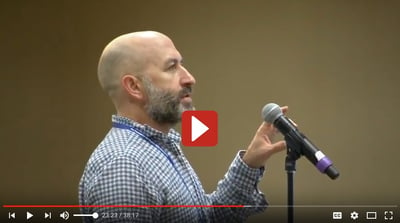 This blog provides a brief summary of the FPWR Research Team: Town Hall Session on PWS Research, a series of four presentations at the FPWR 2017 conference. You can watch the full FPWR Research Team: Town Hall Session on PWS Research presentations here.
This blog provides a brief summary of the FPWR Research Team: Town Hall Session on PWS Research, a series of four presentations at the FPWR 2017 conference. You can watch the full FPWR Research Team: Town Hall Session on PWS Research presentations here.
In case you don't have time to watch the full video series, we've captured some of the key points in the notes below.
The four members of the FPWR Research Team – Nathalie Kayadjanian, Theresa Strong, Priya Balasubramanian and Jessica Bohonowych – gave updates and answered research-related questions from the audience.
Nathalie Kayadjanian, Ph.D.: FPWR’s 5-year Plan
Nathalie is a neuroscientist by training and an expert in translational biomedical research. She joined FPWR in 2015 as the Director of Translational Research. Her presentation covered FPWR’s mission, research approaches and path forward. Nathalie's presentation was about 38 minutes.
Topics covered:
- FPWR’s mission
- Drug development process
- FPWR’s research approach
- Phase 1: 2003-2016, Advance research
- Phase 2: 2017-2021, Accelerate therapeutic development
- FPWR strategic programs
Theresa Strong, Ph.D.: FPWR Grant Program
Theresa is a geneticist and founding member of FPWR. She serves as our Director of Research Programs and is the lead investigator on the Global PWS Registry. Her presentation provided an overview of the FPWR Grant Program, including details on one project from the Genetics Program: the PWS Genomes Project. Theresa's presentation was about 28 minutes.
FPWR Grant Program:
- Supports early-stage, innovative research through a competitive program
- Has invested more than $9 million in research, supporting 135 projects in 13 countries
- Has supported work in more than 125 publications
- Supports research across three categories (in vitro, animal models, clinical) in nine areas (including endocrine and behavior/cognition, etc.)
PWS Genome Project:
- Goal is to launch by the end of 2017/early 2018
- Part of directed research program looking at genetics and what researchers call genotype to phenotype: how does the loss of a gene cause symptoms?
- Crosses variety of clinical issues, from growth hormone deficiency to mental illness
- Aims to predict who will benefit from drugs and who may experience side effects
Priya Balasubramanian, Ph.D.: Clinical Care Program
Priya has a doctoral degree in molecular biology from the University of Southern California. She is FPWR’s Associate Director for Translational Research Programs, helping to advance our clinical care and pharmacotherapy strategic programs. Her presentation detailed the new Clinical Care Program and its projects. Priya's presentation was about 13 minutes.
Clinical Care Program mission: Optimizing existing therapies to improve quality of life for patients and families in the short term.
Given the lengthy drug development and approval process, the Clinical Care Program is investigating ways to repurpose existing drugs and devices to treat high-priority symptoms. There is a four-part plan to achieve the program’s goals that relies on collaboration with researchers, caregivers, parents, clinicians and scientists.
Jessica Bohonowych, Ph.D.: Global Prader-Willi Syndrome Registry
Jessica has a doctorate in Pharmacology and Toxicology from the University of California, Davis. She has experience in the biotech industry and has taught at The Citadel, College of Charleston, and Claflin University. She reviewed the Global Prader-Willi Syndrome Registry and how it is accelerating PWS research and clinical trials. Jessica's presentation was about 13 minutes.
Jessica opened the session by saying, “You guys are all members of the Research Team.” How? By participating in the registry for the first time or updating existing information.
Goals of the Global PWS Registry include:
- To develop a comprehensive database of individuals with PWS
- To better understand the full spectrum of PWS characteristics
- To guide standards of care
Privacy and Safety:
- The registry collects patient data through a series of “surveys”
- De-identified data can be used:
- To find trends and answer questions
- For research and publications
Data tracked includes:
- Age at diagnosis
- Growth hormone use
- Anxiety in PWS
- Sleep apnea
Helpful resources:
- Getting started video & PDF
- Information on how to update your survey
- Facebook group
- PWS registry contact email
You can watch the full FPWR Research Team: Town Hall Session on PWS Research presentations here.








